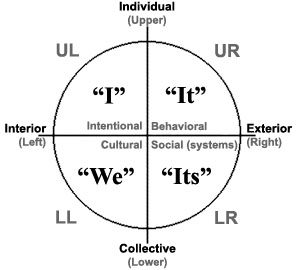|
TRANSLATE THIS ARTICLE
Integral World: Exploring Theories of Everything
An independent forum for a critical discussion of the integral philosophy of Ken Wilber
 Frank Visser founded IntegralWorld.net in 1997 (back then under the name of "The World of Ken Wilber"). He is the author of the first monograph on Ken Wilber and his work: "Ken Wilber: Thought as Passion" (SUNY Press, 2003), which has been translated into 7 languages, and of many essays on this website. He currently is Service Desk Manager at the Dutch division of the global online marketing agency DigitasLBi. Frank Visser founded IntegralWorld.net in 1997 (back then under the name of "The World of Ken Wilber"). He is the author of the first monograph on Ken Wilber and his work: "Ken Wilber: Thought as Passion" (SUNY Press, 2003), which has been translated into 7 languages, and of many essays on this website. He currently is Service Desk Manager at the Dutch division of the global online marketing agency DigitasLBi.Integral WorldAbout this WebsiteFrank Visser
Integral philosophy, claiming such wide implications, should make it a point of honor to listen to criticism.
This website started out in 1997 as a fansite for Ken Wilber. Its history I have described in more detail in two essays: "A Brief History of Integral World: Ten Years of Integral Debate" (May 2007) and "A Brief History of Integral World: Part II: Carving a Niche in the Integral Landscape" (March 2013). A more personal report of my dealings with Wilber can be found in the essay "The Trouble with Ken Wilber: A Plea For a Change of Discourse" (April 2008). For those of you who are first time visitors of Integral World and who would like to know my current position regarding Ken Wilber, I would phrase it like this: Let yourself be inspired by Ken Wilber, but always remember: keep thinking for yourself. I would even state it more strongly: there comes a point in your study of Ken Wilber, that you have to decide for yourself where your loyalties rest: Wilber or Truth? Let me explain. If we take Wilber's every word as gospel, this will give us an optimistic philosophy of life, of cosmic dimensions, supposedly backed up by science. If we, Wilber says, collect all the accepted truths of science, philosophy and religion and integrate them into one Kosmic canon, the result will be nothing less than a modern-day spirituality. However, not many other philosophers have come to this conclusion. Of course, Wilber himself is searching for Truth. The many books he has written are testimony to this. Jack Crittenden, a former associate of Wilber, wrote on Beliefnet.com: The result is the "integral system" that Wilber has elaborated in his many books, a system that appears to incorporate the greatest number of orienting generalizations from the greatest number of fields of human inquiry. Thus, if it holds up, Wilber's approach incorporates and honors, it integrates, more truth than any other system in history. 
But has Wilber succeeded in this huge project? To answer that question, independent research into the value of his many writings has to be performed. And here, obviously, Wilber himself cannot be the final arbiter. (See "Who Decides What Wilber Means?") Nor can, for that matter, the many semi-academic offshoots that have arisen in the past years and that take Wilber's AQAL paradigm more or less for granted. For starters, we might want to differentiate between areas where Wilber's statements have been helpful, such as psychology and spirituality (though many have disapproved of his endorsement of controversial gurus, such as Adi Da and Andrew Cohen), and areas where he has shown to be less on solid ground, such as politics or cultural criticism (most notably his crusade against Boomeritis), or even wildely off the mark, such as in physics or evolutionary theory—an area which I myself have investigated in more detail (see "Heavy Elements: Why Integral Physics is Lost in Space" and "The 'Spirit of Evolution' Reconsidered", respectively). For what it's worth, in the thousands of pages of Integral World you will find close to a hundred authors (see our Reading Room) trying to get to the truth of Ken Wilber's writings, independent of any Wilber-inspired organization. One of Wilber's motto's is "Nobody is smart enough to be wrong all the time". To which we can add: "Ken Wilber is not smart enough to be right all the time." Some of his critics (see "A Spectrum of Wilber Critics") doubt even he is right most of the time. Judge for yourself. In any case, integral philosophy, claiming such wide implications, should make it a point of honor to listen to criticism, from all corners, especially when it comes from those who are (or were) sympathetic to Wilber's project but have come to harbour second thoughts.
|